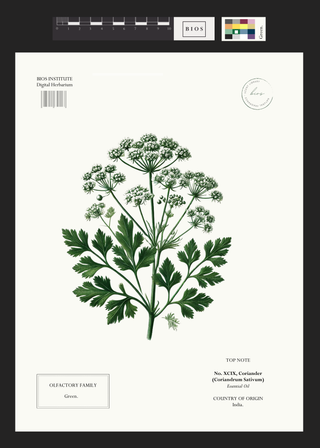

Coriandrum sativum, commonly known as coriander or cilantro, is native to the regions of Southern Europe, Northern Africa, Western Asia, and India, where ours is sourced from. It is believed to have originated in the Mediterranean region and has been cultivated and used as a culinary herb for thousands of years.
Coriander is a versatile herb with both the leaves (cilantro) and the seeds being used in various cuisines around the world. The fresh leaves are often used as a garnish or added to dishes for their bright and citrusy flavor, while the seeds are used as a spice and have a warm, aromatic, and slightly citrusy taste.
Coriander essential oil has a fresh, spicy, and slightly citrusy scent. It possesses a warm and herbal character with hints of sweetness. The aroma of coriander can be described as uplifting, refreshing, and energizing.
In perfumery, coriander is a top note in our Green family. It provides a balancing effect and helps to harmonize the overall fragrance composition.
Coriander blends well with various other fragrance notes, including citrus, floral, woody, and spicy notes. It is often used to add a fresh and aromatic touch to perfumes, colognes, and other fragrances.
Coriander may symbolize different things in different cultures. It can represent freshness, vitality, and a connection to nature. Its aromatic properties are often linked to invigorating the senses and promoting a sense of well-being.
The use of coriander in perfumery is also influenced by its culinary associations. Its inclusion in fragrances can evoke images of culinary delights, adding a touch of culinary inspiration to the scent experience.
Overall, coriander brings its distinct aroma and cultural heritage to perfumery, adding a fresh, aromatic, and sometimes culinary touch to fragrances. Its versatility and unique scent profile make it a valuable ingredient in the world of perfumery.
Coriander is widely used in Asian cuisines, including Indian, Thai, Chinese, and Vietnamese cuisine. It is considered an essential herb and spice, adding a fresh, aromatic, and citrusy flavor to dishes. In these cultures, coriander is highly valued for its culinary properties and is an integral part of traditional recipes.
Coriander has been used for centuries in traditional medicine systems such as Ayurveda and Traditional Chinese Medicine. It is believed to have various medicinal properties, including aiding digestion, reducing inflammation, and promoting overall health and well-being.
Coriander is a common ingredient in Middle Eastern and Mediterranean cuisines. It is used in dishes such as hummus, falafel, and various spice blends like ras el hanout. It contributes a distinctive flavor and aroma to these culinary traditions.
In some cultures, coriander has been used in religious and ritual practices. For example, in Hinduism, coriander is considered sacred and is used as an offering in temples. It is also used in rituals related to purification and healing.
Coriander may carry symbolic meanings in certain cultures. In some traditions, it is associated with love, fertility, and protection. It can also symbolize freshness, renewal, and spiritual purification.
Coriander
- Unit price
- /per
Please note this product format is a small vial that contains roughly 20 drops of scent concentrate. This can be purchased à la carte but is intended to be used with our Perfume Kit.
SCENT SPECIFICATIONS
Latin Name: Coriandrum Sativum
Extraction Method: Steam Distilled
Country of Origin: India
All of the scents in our library are naturally derived - our collection includes essential oils, absolutes, concretes, isolates, enfleurage, macerations, oleoresins, and mixed medium naturals.
Adding product to your cart
Coriandrum sativum, commonly known as coriander or cilantro, is native to the regions of Southern Europe, Northern Africa, Western Asia, and India, where ours is sourced from. It is believed to have originated in the Mediterranean region and has been cultivated and used as a culinary herb for thousands of years.
Coriander is a versatile herb with both the leaves (cilantro) and the seeds being used in various cuisines around the world. The fresh leaves are often used as a garnish or added to dishes for their bright and citrusy flavor, while the seeds are used as a spice and have a warm, aromatic, and slightly citrusy taste.
Coriander essential oil has a fresh, spicy, and slightly citrusy scent. It possesses a warm and herbal character with hints of sweetness. The aroma of coriander can be described as uplifting, refreshing, and energizing.
In perfumery, coriander is a top note in our Green family. It provides a balancing effect and helps to harmonize the overall fragrance composition.
Coriander blends well with various other fragrance notes, including citrus, floral, woody, and spicy notes. It is often used to add a fresh and aromatic touch to perfumes, colognes, and other fragrances.
Coriander may symbolize different things in different cultures. It can represent freshness, vitality, and a connection to nature. Its aromatic properties are often linked to invigorating the senses and promoting a sense of well-being.
The use of coriander in perfumery is also influenced by its culinary associations. Its inclusion in fragrances can evoke images of culinary delights, adding a touch of culinary inspiration to the scent experience.
Overall, coriander brings its distinct aroma and cultural heritage to perfumery, adding a fresh, aromatic, and sometimes culinary touch to fragrances. Its versatility and unique scent profile make it a valuable ingredient in the world of perfumery.
Coriander is widely used in Asian cuisines, including Indian, Thai, Chinese, and Vietnamese cuisine. It is considered an essential herb and spice, adding a fresh, aromatic, and citrusy flavor to dishes. In these cultures, coriander is highly valued for its culinary properties and is an integral part of traditional recipes.
Coriander has been used for centuries in traditional medicine systems such as Ayurveda and Traditional Chinese Medicine. It is believed to have various medicinal properties, including aiding digestion, reducing inflammation, and promoting overall health and well-being.
Coriander is a common ingredient in Middle Eastern and Mediterranean cuisines. It is used in dishes such as hummus, falafel, and various spice blends like ras el hanout. It contributes a distinctive flavor and aroma to these culinary traditions.
In some cultures, coriander has been used in religious and ritual practices. For example, in Hinduism, coriander is considered sacred and is used as an offering in temples. It is also used in rituals related to purification and healing.
Coriander may carry symbolic meanings in certain cultures. In some traditions, it is associated with love, fertility, and protection. It can also symbolize freshness, renewal, and spiritual purification.
